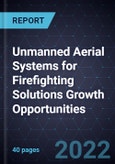New Product Development in Drone Technology Enables Firefighters to Prevent and Suppress Wildfires
Climate change is one of the main factors contributing to the extended duration and expansion of wildfires worldwide. In response to this new global scenario, firefighting agencies are adopting technologies to prevent, suppress, and recover from wildfires. Commercial drone platforms are being integrated into existing firefighting workflows to reduce costs, improve resource allocation, and save lives by providing situational awareness to ground units quickly and safely. Despite the need for drones, several challenges, such as constrained public budget, limit adoption due to the many costs associated with this technology. Firefighting end users are subject to restrictive regulations, which prevent widespread commercial drone adoption, forcing them to rely on special permits to enable beyond visual line of sight (BVLOS) flights during operations.
This report details how firefighting agencies introduce drone technology into their operations. It discusses unmanned systems for other domains, ground and maritime, and their use in firefighting. Drones are categorized into consumer and prosumer, and professional segments, depending on commercial value, with a discussion of the main strengths. In addition, the study mentions manufacturers developing drone solutions for this segment, along with the main characteristics of their product lines.
Growth opportunities detail how market participants can leverage the drivers shaping this market to achieve growth. Information for this study is from reports in the publisher's internal database, unmanned systems research papers, and magazines specialized in unmanned technology use for public safety. Interviews were conducted with representatives from industry participants to validate the information and gather insights into drivers and restraints shaping the market.








